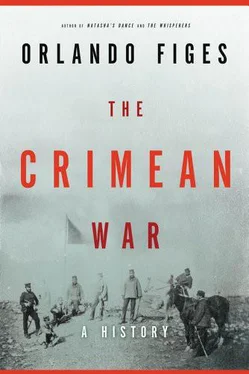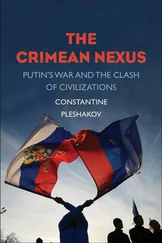During the first quarter of the nineteenth century the other national Churches (Bulgarian and Serb) gradually assumed an equal importance to the Greek-dominated patriarchy in Constantinople. Greek domination of Orthodox affairs, including education and the courts, was unacceptable to many Slavs, who looked increasingly to their own Churches for their national identity and leadership against the Turks. Nationalism was a potent force among the different groups of Balkan Christians – Serbs, Montenegrins, Bulgarians, Moldavians, Wallachians and Greeks – who united on the basis of their language, culture and religion to break free from Ottoman control. The Serbs were the first to win their liberation, by means of Russian-sponsored uprisings between 1804 and 1817, leading to the Turkish recognition of Serb autonomy and eventually to the establishment of a principality of Serbia with its own constitution and a parliament headed by the Obrenović dynasty. But such was the weakness of the Ottoman Empire that its collapse in the rest of the Balkans appeared to be only a question of time.
Long before the Tsar described the Ottoman Empire as the ‘sick man of Europe’, on the eve of the Crimean War, the idea that it was about to crumble had become a commonplace. ‘Turkey cannot stand, she is falling of herself,’ the Prince of Serbia told the British consul in Belgrade in 1838; ‘the revolt of her misgoverned provinces will destroy her.’ 8
That misgovernment was rooted in the empire’s failure to adapt to the modern world. The domination of the Muslim clergy (the mufti and the ulema) acted as a powerful brake on reform. ‘Meddle not with things established, borrow nothing from the infidels, for the law forbids it’ was the motto of the Muslim Institution, which made sure that the sultan’s laws conformed to the Koran. Western ideas and technologies were slow to penetrate the Islamic parts of the empire: trades and commerce were dominated by the non-Muslims (the Christians and Jews); there was no Turkish printing press until the 1720s; and as late as 1853 there were five times as many boys studying traditional Islamic law and theology in Constantinople as there were in the city’s modern schools with a secular curriculum. 9
The stagnation of the economy was matched by the proliferation of corrupt bureaucracy. The purchasing of offices for the lucrative business of tax-farming was almost universal in the provinces. Powerful pashas and military governors ruled whole regions as their personal fiefdoms, squeezing from them as many taxes as they could. As long as they passed on a share of their revenues to the Porte, and paid off their own financial backers, no one questioned or cared much about the arbitrary violence they employed. The lion’s share of the empire’s taxes was extracted from the non-Muslims, who had no legal protection or means of redress in the Muslim courts, where the testimony of a Christian counted for nothing. It is estimated that by the early nineteenth century the average Christian farmer and trader in the Ottoman Empire was paying half his earnings in taxes. 10
But the key to the decline of the Ottoman Empire was its military backwardness. Turkey had a large army in the early nineteenth century, and it accounted for as much as 70 per cent of treasury expenditure, but it was technically inferior to the modern conscript armies of Europe. It lacked their centralized administration, command structures and military schools, was poorly trained and was still dependent on the recruitment of mercenaries, irregulars and tribal forces from the periphery of the empire. Military reform was essential, and recognized as such by reformist sultans and their ministers, particularly after the repeated defeats by Russia, followed by the loss of Egypt to Napoleon. But to build a modern conscript army was impossible without a fundamental transformation of the empire to centralize control of the provinces and overcome the vested interests of the 40,000 janizaries, the sultan’s salaried household infantry, who represented the outmoded traditions of the military establishment and resisted all reforms. 11
Selim III (1789–1807) was the first sultan to recognize the need to Westernize the Ottoman army and navy. His military reforms were guided by the French, the major foreign influence on the Ottomans in the final decades of the eighteenth century, mainly because their enemies (Austria and Russia) were also the enemies of the Ottoman Empire. Selim’s concept of Westernization was similar to the Westernization of Russia’s institutions carried out by Peter the Great in the early eighteenth century, and the Turks were conscious of this parallel. It involved little more than the borrowing of new technologies and practices from foreigners, and certainly not the adoption of Western cultural principles that might challenge the dominant position of Islam in the empire. The Turks had invited the French to advise them, partly because they assumed they were the least religious of the European nations and therefore the least likely to threaten Islam – an impression gained from the anti-clerical policies of the Jacobins.
Selim’s reforms were defeated by the janizaries and the Muslim clergy, who were opposed to any change. But they were continued by Mahmud II (1808–39), who built up the military schools established by Selim to undermine the janizaries’ domination of the army by promoting officers on a meritocratic basis. He pushed through reforms of military dress, introduced Western equipment, and abolished the janizaries’ fiefdoms in an effort to create a centralized European-style army into which the Sultan’s household guards would eventually be merged. When the janizaries rebelled against the reforms, in 1826, they were put down, with several thousand killed by the Sultan’s new army, and then liquidated by imperial decree.
As the Sultan’s empire weakened to the point where it seemed in danger of imminent collapse, the great powers intervened increasingly in its affairs – ostensibly to protect the Christian minorities but in reality to advance their own ambitions in the area. European embassies were no longer content to limit their contacts to the Ottoman administration, as they had done previously, but took a hand directly in the empire’s politics, supporting nationalities, religious groups, political parties and factions, and even interfering in the Sultan’s appointment of individual ministers to promote their own imperial interests. To advance their country’s trade they developed direct links with merchants and financiers and established consuls in the major trading towns. They also began to issue passports to Ottoman subjects. By the middle of the nineteenth century as many as one million inhabitants of the Sultan’s empire were using the protective powers of the European legations to escape the jurisdiction and taxes of the Turkish authorities. Russia was the most active in this respect, developing its Black Sea commerce by granting passports to large numbers of the Sultan’s Greeks and allowing them to sail under the Russian flag. 12
For the Orthodox communities of the Ottoman Empire, Russia was their protector against the Turks. Russian troops had helped the Serbs to gain autonomy. They had brought Moldavia and Wallachia under Russian protection, and liberated the Moldavians from Turkish rule in Bessarabia. But the Russians’ part in the Greek independence movement showed how far they were prepared to go in their support of their co-religionists to exert their hold over Turkey’s European territories.
The Greek revolution really began in Russia. In its early stages it was led by Greek-born Russian politicians who had never even been to mainland Greece (a ‘geographical expression’ if ever there was one) but who dreamed of uniting all the Greeks through a series of uprisings against the Turks, which they planned to begin in the Danubian principalities. In 1814 a Society of Friends ( Philiki Etaireia ) was set up by Greek nationalists and students in Odessa, with affiliated branches established soon thereafter in all the major areas where the Greeks lived – Moldavia, Wallachia, the Ionian islands, Constantinople, the Peloponnese – as well as in other Russian cities where the Greeks were strong. It was the Society that organized the Greek uprising in Moldavia in 1821 – an uprising led by Alexander Ypsilantis, a senior officer in the Russian cavalry and the son of a prominent Phanariot family in Moldavia that had fled to St Petersburg on the outbreak of the Russo-Turkish war in 1806. Ypsilantis had close connections to the Russian court, where he had received the patronage of the Empress Maria Fedorovna (the widow of Paul I) from the age of 15. Tsar Alexander I had appointed him his aide-de-camp in 1816.
Читать дальше












